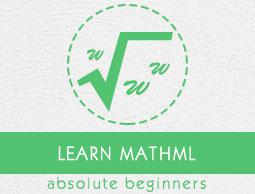Following is the list of important MathML elements.
<maction> − Provides option to bind actions to subexpressions/expressions.
<math> − It is top or root level element and is used to encapsulate each instance of MathML instance. Every valid MathML expression should be wrapped in outer <math> tag. It can contain any number of child elements. One math element cannot contain another math element tag.
<menclose> − Renders its content inside an enclosing notation specified by the notation attribute.
<merror> − Used to display contents as error message.
<mfenced> − Provides the option to add custom opening and closing parentheses and separators to an expression.
<mfrac> − Used to display fractions.
<mglyph> − Used to display non-standard symbols where existing Unicode characters are not available.
<mi> − Used to specify an identifier such as name of a variable, function or a constant etc. For example, <mi>PI</mi> .
<mlabeledtr> − Used to represent a label in a row either on the left or on the right side using side attribute of mtable. Child elements of mlabeledtr must be mtd elements.
<mmultiscripts> − Provides options to create tensor-like objects.
<mn> − Used to specify a numerical literal like 3.14 etc. For example, <mn>3.14</mn>.
<mo> − Used to specify an operator like +, - etc. For example, <mo>+</mo>.
<mover> − Used to attach an accent or a limit over an expression.
<mpadded> − Used to add extra padding and to set the general adjustment of position and size of enclosed contents.
<mphantom> − Used to create space as it is rendered invisibly, keeping height, width, and baseline position intact.
<mroot> − Used to display roots with an explicit index.
<mrow> − Used to group any number of sub expressions in horizontal way.
<ms> − Used to represent a string literal meant to be interpreted by programming languages and computer algebra systems.
<mspace> − Used to display a blank space, where its size is set using its attributes.
<msqrt> − Used to display square root.
<mstyle> − Used to apply the style on its children.
<msub> − Used to attach a subscript to an expression. It uses the following syntax: <msub> base subscript </msub>.
<msubsup> − Used to attach both a subscript and a superscript, together, to an expression. It uses the following syntax: <msubsup> base subscript superscript </msubsup>.
<msup> − Used to attach a superscript to an expression. It uses the following syntax: msup base superscript </msup>.
<mtable> − Provides options to create tables or matrices.
<mtd> − To represent a cell in a table or a matrix.
<mtext> − Used to render text with no notational meaning, such as comments or annotations.
<mtr> − Represents a row in a table or a matrix.
<munder> − Provides option to attach an accent or a limit under an expression. It uses the following syntax: <munder> base underscript </munder>
<munderover> − Provides option to attach accents or limits both under and over an expression. It uses the following syntax: </munderover> base underscript overscript </munderover>
<semantics> − <semantics>,<annotation> and <annotation-xml> are used to add presentation and content markup and provides both, layout information and semantic meaning of mathematical expressions.


